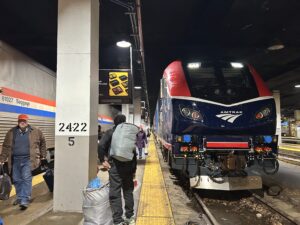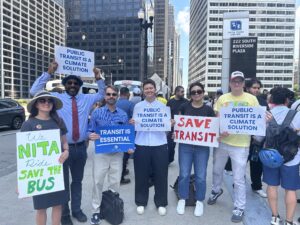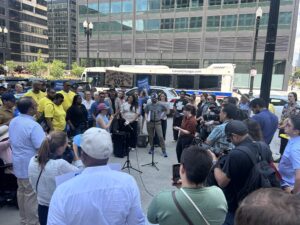CTA Blue Line Train
August 13, 2025
Illinoisans Press for Special Session to Avoid Transit Cuts, Layoffs
Transit advocates rallied this summer after the state legislature failed to address public transit’s $770 million budget gap this spring
By
By Hannah Davidson, ELPC Intern Summer 2025
Twice this summer, hundreds rallied to call on state lawmakers and Governor JB Pritzker to save Chicago transit from looming budget cuts. Hundreds attended the Fix and Fund Transit rally on June 26, as well as the Save Transit rally on Saturday, July 12, including state lawmakers who have been champions for this legislation such as Senator Ram Villivalam. Fueling the call to action are community members and advocacy groups, including the Labor Alliance for Public Transportation and the Illinois Clean Jobs Coalition, whose members include ELPC, Better Streets Chicago, the Active Transportation Alliance, and many more.
Without additional state funding, experts predict that a 40% reduction in service and 3,000+ layoffs will take place to fill the Regional Transit Authority’s (RTA) $771 million budget gap. This will likely translate into fewer transit stops, longer wait times, and decreased maintenance and operational performance across CTA, Metra, and Pace service in the city and suburbs.
Illinois lawmakers had a chance to plug the budget gap this spring through passage of House Bill (HB) 3438, which proposed a sweeping set of reforms and an additional $1.5 billion in funding. While the bill passed the Senate, it did not receive a vote in the House. If the leadership of the General Assembly or the Governor calls for a special session this summer, lawmakers can come back and finish the job. Otherwise, the next opportunity to pass a bill will not be until October.
Lawmakers must pass the bill urgently to save the system. This is a crisis and an opportunity. These improvements will improve ridership and keep Chicago transit running smoothly for future generations. Tell your lawmakers to pass the bill!
What do Advocates Want?
Aside from fighting to avoid service cuts and layoffs, public transit supporters are vying for serious improvements to the rider and worker experience. We’re talking integrated fares, seamless transfers, reduced wait-times, and improved governance. HB 3438 would create a new regional agency called the Northern Illinois Transit Authority (NITA) to replace the RTA and take on many overlapping functions from the three transit operators (CTA, Metra, Pace).
 Some benefits of the proposed reforms:
Some benefits of the proposed reforms:
- Integrated fares, coordinated schedules, and region-wide service standards would reduce wait times and make it easier to complete trips across Chicagoland.
- NITA’s new governance structure would improve transparency and accountability
- New IDOT committee & NITA authority would prioritize bus transit on roadways, to enforce dedicated bus lanes and make way for bus rapid transit
- A new multidepartmental task force and transit ambassadors will reduce crime on transit, in addition to other proven safety measures.
- Statewide benefits include funding and better coordination for intercity passenger rail and the 50+ downstate transit agencies serving 2/3rd of the state’s population
Why Should You Care?
Here’s what to expect if Illinois’ elected officials don’t deliver on public transit reform:
Traffic
- Over 500,000 bus riders will be cut off from their local stops, pushing commuters onto roadways. With traffic already clogging Chicago’s expressways, creating some of the country’s worst traffic, advocates are looking for legislative solutions to avoid this logistical nightmare.
- “If people can’t take mass transit, they’re going to be forced to take the roadways, which would have the same effect as shutting down lanes” said Orlando Rojas, a legislative representative of Local 653 and Metra conductor for 20+ years, at a June 26th
Economy
-

Projected cuts to Metra & CTA train systems in Northeastern Illinois (click to see full MPC analysis)
Chicago’s public transit system is an economic generator for the state, carrying thousands of people to visit and work in the city. Experts estimate that the Chicago region could face a $2.6 billion dollar loss in gross domestic product in the first year of service cuts.
- “Without this bill, downstate transit is not going to get the money they need…everyone has transportation needs” said one advocate on June 26.
Quality of Life
- State Senator Graciela Guzmán, who spoke at the June 26th rally, shared some of her constituents’ concerns around public transit funding: “I cannot get to work if we don’t fund transit. How will my kid get to school? I don’t know if I can live in my neighborhood if I’m not near transit anymore. Will I have a job if we don’t fund transit?”
- Wheaton resident Evan Urchell took Metra and walked 40 minutes to Northwestern to receive treatment for Ewing’s Sarcoma. He spoke at the June 26th rally as a member of The People’s Lobby, saying “it’s very important that people have access to an accessible, equitable system that lets you get around without a car. It doesn’t matter if you’re in the suburbs or the city or downstate. It is a public necessity.”
Essential Workers
- “These are the same workers that were deemed essential during the COVID-19 pandemic that triggered this fiscal cliff. The same workers that provided transportation to other essential workers and the most vulnerable in our region…Those same workers are now being told to wait until the fall veto session in October, with no guarantee that there will be a funding solution…and knowing that pink slips come out in September. We are calling on our elected officials to do the right thing” added Orlando Rojas at the June 26th
- When federal COVID-19 relief funding runs out in 2026, transit workers could start receiving layoff notices in a matter of months. We must pass the bill to save their jobs and the people who depend on them to provide medical care, childcare, and other essential services.
Environment
- Public transit is a climate solution. On average, taking the CTA results in 60% less carbon pollution than driving a car by yourself.
- As RTA Chairman Kirk Dillard noted, “Chicagoans need to know that one of the best ways to immediately and positively impact our air quality and reduce our greenhouse gas emissions is to choose public transportation”
A Call to Action
Outraged by the state government’s lack of urgency and attention, advocates have rallied this summer to call for a special session to pass transit reform. Despite high temperatures and humidity, a diverse group of people, united by transit, came together to call for change and hope.
Gov. Pritzker is not the only one who can convene a special lawmaking session – the Illinois Speaker of the House, Rep. Emmanual Chris Welch, and President of the Senate, Don Harmon, can file a joint proclamation and call for a special session. That is why Illinois residents are rallying, sharing stories, and applying pressure to their elected officials.
The next scheduled opportunity for lawmakers to pass transit funding comes in October, during the brief 2-week Veto session, where Springfield comes together to pass any remaining or pending legislation from the spring.
The call to save Chicago’s public transit has never been more urgent. Every minute that transit agencies spend planning for cuts is a minute not spent on improvements. For more information on how to contact your legislators – your state representative, state senator, and state governor — click this link.



